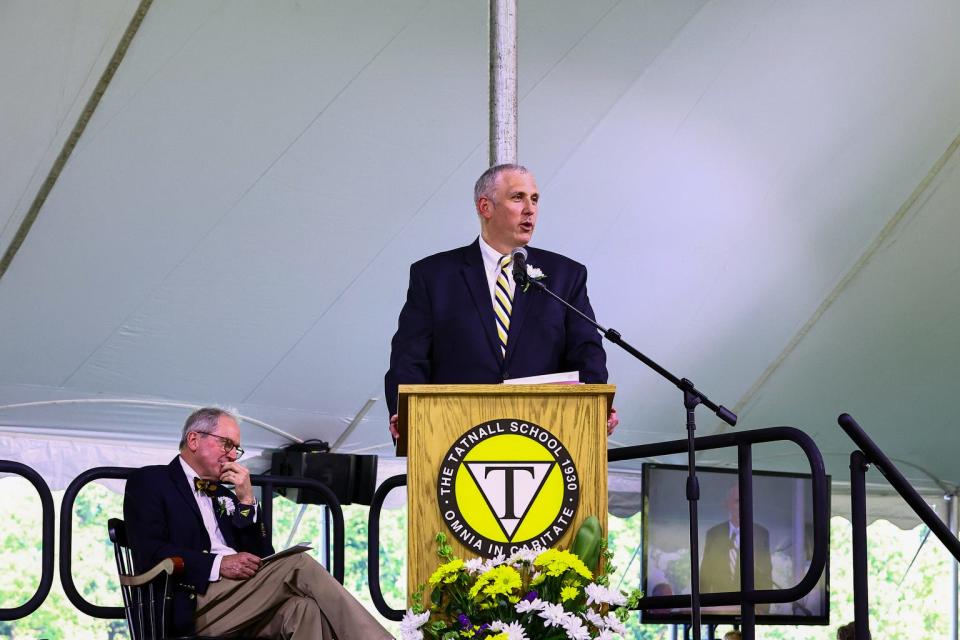This is how outdoor learning can make every day Earth Day in Delaware students | Opinion
- Oops!Something went wrong.Please try again later.
Since the first Earth Day was celebrated on April 22, 1970, millions of people across the United States have participated in events meant to raise awareness and promote action on environmental issues. Every year when Earth Day rolls around, we at the Tatnall School feel especially grateful for what we have in Delaware — 17 state parks in three counties, plenty of greenways that offer walking, running and biking trails for all levels of exercise, and so much more — that remind us of the importance of protecting our environment.
For Tatnall’s staff and families, there is more to having a healthy, safe outdoor environment than meets the eye. We place heavy value in the correlation between the outdoors and exercising the mind. In fact, studies have long supported outdoor education and play for pre-school and elementary school-aged children. Students who have the opportunity to learn outdoors develop independence, confidence and empathy toward others while also improving their decision-making, problem-solving and motor skills. Being outside allows for a unique and dynamic environment with natural — even unpredictable — stimuli that can capture students’ attention in ways sitting indoors at a desk simply cannot. Providing an open and unstructured environment can inspire students to think outside the box and explore new ideas. And this can help students develop problem-solving skills and creativity, which are essential for success in many fields, including STEM and the arts.
The Tatnall School has always been committed to the benefits of outdoor play and education, offering one of only two certified outdoor classrooms in Delaware. Our early-learning playgrounds seamlessly blend the natural world and dynamic play structures to promote critical early-childhood development. Our learning environment also boasts a nature preserve, wetlands boardwalk, frog pond, gazebo and outdoor art studio.
Then, as the world found the need to navigate through the COVID-19 pandemic and virtual learning became “the norm,” The Tatnall School pivoted to make the best use of our 110-acre campus and bring kids back for in-person learning. During the summers of 2020 and 2021, we invested in rapid transformations of unique outdoor learning spaces to expand opportunities for all grades. We constructed five unique outdoor classrooms with weatherproof whiteboards, natural collaboration stations, Wi-Fi access and furniture crafted from fallen trees.
During pandemic restrictions, Tatnall’s faculty held more than 1,000 individual lessons in these outdoor classrooms, which proved to be popular in supporting lessons across all grade levels. We found students were more engaged in outdoor lessons, more apt to collaborate, and much less prone to the anxieties and malaise we now associate with distance learning and social distancing. The success of these outdoor classrooms turned what was at first a temporary solution into a permanent complement to the “traditional” classroom structure.
While we know not every school in our state has the land on which to build outdoor classrooms, there are many ways we as educators can be creative in bringing the outdoors to our students. Here are some potential opportunities:
Healthy Foods for Healthy Kids — a nonprofit dedicated to creating vegetable gardens in every school throughout the state.
The Delaware Department of Agriculture’s Farm to School resources.
Grant funding, which can provide schools with the dollars needed to reimagine the outdoor spaces they do have. A $50,000 grant from the Dorr Foundation last year has allowed Tatnall to expand our environmental science program, bolstering our students’ ability to explore the natural habitats on campus for observation, field testing and real-world application.
As we celebrate Earth Day 2023 and its theme of “Invest in Our Planet,” I invite Delawareans to consider the ways investing in students’ outdoor education carries out this mission! During our COVID “pivot,” the outdoor classrooms and experiences Tatnall created sparked the interest of our students in pursuing environmental science at high levels. Interest in our 9th grade Environmental Science Research Class and AP Environmental Science program has taken off, and we recently announced a partnership with the University of Delaware that gives our high school students access to collegiate-level courses in environmental science. This will begin in earnest next year. We are creating the next generation of advocates, activists, scientists and other professionals who will help ensure a planet that thrives and is sustainable.
More perspective: Earth Day should be every day in Delaware | Opinion
Moreover, as we celebrate Earth Day, we hope all educators see this as an opportunity to expand on what we already know — that outdoor learning can promote a deeper appreciation and understanding of the natural world. This can inspire students in myriad ways, improve their mood and mental health, and lead to more productive and enjoyable learning experiences for us all.
Andrew D. Martire is head of school at Tatnall School.

This article originally appeared on Delaware News Journal: Earth Day 2023 Delaware outdoor

